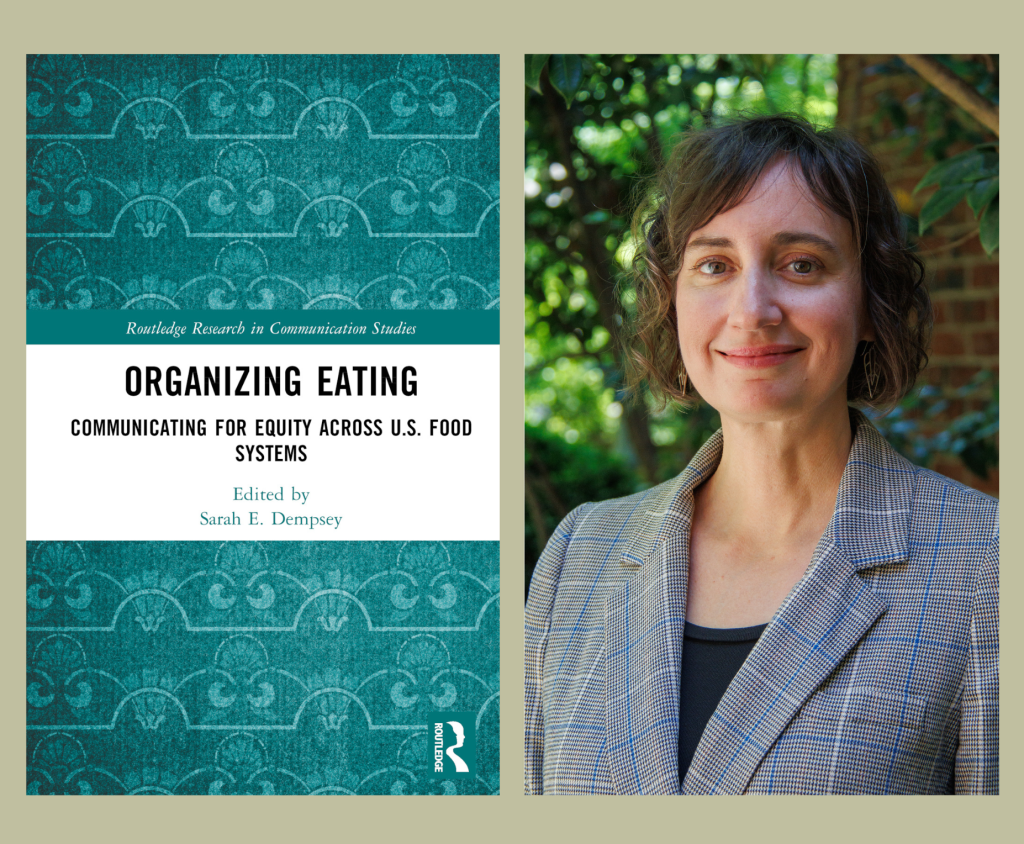Bookmark This is a feature that highlights new books by College of Arts and Sciences faculty and alumni, published each month. The February featured book is Organizing Eating: Communicating for Equity Across U.S. Food Systems (Routledge Taylor & Francis Group), edited by Sarah E. Dempsey.
 Q: Can you give us a brief synopsis of your book?
Q: Can you give us a brief synopsis of your book?
A: This edited book is a collaborative project that brings together 17 contributors who are responding to the need to transform our current food systems around principles of equity and justice.
The book offers readers the framework of “organizing eating” to understand how communication and power combine to actively shape how we eat and work within the U.S. food system. Each chapter provides a different view into how communication about food mediates, maintains and potentially challenges the dominant ways that eating is being organized. Throughout, the chapters balance between providing a critical analysis of current food practices and bringing attention to alternatives that can allow for more equitable outcomes. Readers will come away with, for example, an analysis of how the Farm Bill actively structures our food system alongside an understanding of the transformative possibilities of adopting a “Right to Food” approach organized around racial equity. Throughout, the chapters examine the interplay between broader structures of power, everyday organizing practices and openings for new pathways.
A key feature of the book involves providing grounded insight into the everyday dynamics of organizing for change within the food system, from community responses to water injustice in Detroit, Michigan, to the ways that food chain workers are collectively organizing to challenge corporate power, to the tensions around gender, race, class and gentrification within food governance initiatives in Denver, Colorado. We also get a look at the classed practices of food within unemployment agencies in the Midwest and the dynamics of place-based food organizing in Appalachia. Other chapters investigate potential openings for change within the contested spaces of community-supported agriculture and worker-owned cooperatives.
Q: How does this fit in with your research interests and passions?
 A: I am trained as a critical organizational communication scholar, and much of my research and teaching focuses on understanding contemporary modes of power, with a focus on work, labor and everyday organizing. I am drawn to questions that take up the push and pull between contemporary power relations governing work and professional life and how these very conditions give rise to alternative possibilities. The food system is an important site to explore these questions, and my recent research has focused on issues of work and labor within the restaurant industry and the meatpacking industry. This book builds on my ongoing interest in how food chain workers are organizing for change.
A: I am trained as a critical organizational communication scholar, and much of my research and teaching focuses on understanding contemporary modes of power, with a focus on work, labor and everyday organizing. I am drawn to questions that take up the push and pull between contemporary power relations governing work and professional life and how these very conditions give rise to alternative possibilities. The food system is an important site to explore these questions, and my recent research has focused on issues of work and labor within the restaurant industry and the meatpacking industry. This book builds on my ongoing interest in how food chain workers are organizing for change.
The book has also been meaningfully shaped through the conversations I’ve had working alongside students and community-based partners involved in my “Food Politics” and “Communication and Nonprofits” seminars over the years. Both classes incorporate engaged communication scholarship in partnership with local community-based efforts aimed at addressing issues of food insecurity, hunger and food equity.
What I find exciting about this project is that each of the contributors are similarly involved in community-engaged research and teaching around issues of food, and the overall project reflects a multi-layered collective conversation.
Q: What was the original idea that made you think: “There’s a book here?”
A: The idea for this project grew out of conversations with many of the contributors over many years of conferences and paper sessions around the need to sharpen the frameworks we have around food, communication, organizing and power. We were all wrestling with similar questions. These conversations gained increased urgency during the COVID-19 pandemic, underscoring the need for communication frameworks, infrastructures and practices that could enable more equitable food systems practices.
Q: What surprised you when researching/writing this book?
A: The most surprising outcome has been to underscore the value of collaborative research. Research and writing are often so tied to a model of the lone individual, but this project has shown me that building and nurturing conversations is also a valuable research contribution.
Q: Where’s your go-to writing spot, and how do you deal with writer’s block?
A: I love to write in the outside spaces on campus or around Chapel Hill where I can hear birds, insects and trees moving with the wind. On campus, that includes the Coker Arboretum or even my office in Bynum Hall with the windows wide open. Both the North Carolina Botanical Garden and the Chapel Hill Public Library have great porches for writing.
My strategy for dealing with writer’s block is to free write on why I might be feeling stuck. Forcing myself to write about what feels difficult or why a section or idea isn’t coming together usually prompts new insights and a way forward. And chocolate always helps.
Sarah E. Dempsey is an associate professor in the department of communication. She teaches courses on organizational communication, feminist theories of work, nonprofit organizing and food politics. Her current research examines the values and practices animating the living wage movement and its impacts on the restaurant industry. She is the recipient of an APPLES Service Learning Teaching Excellence Award and a Thorp Faculty Engaged Scholar award from the Carolina Center for Public Service.
Nominate a book we should feature by emailing college-news@unc.edu. Looking for more faculty and alumni books to add to your reading list? Check out our fall ’23 College magazine books list.
